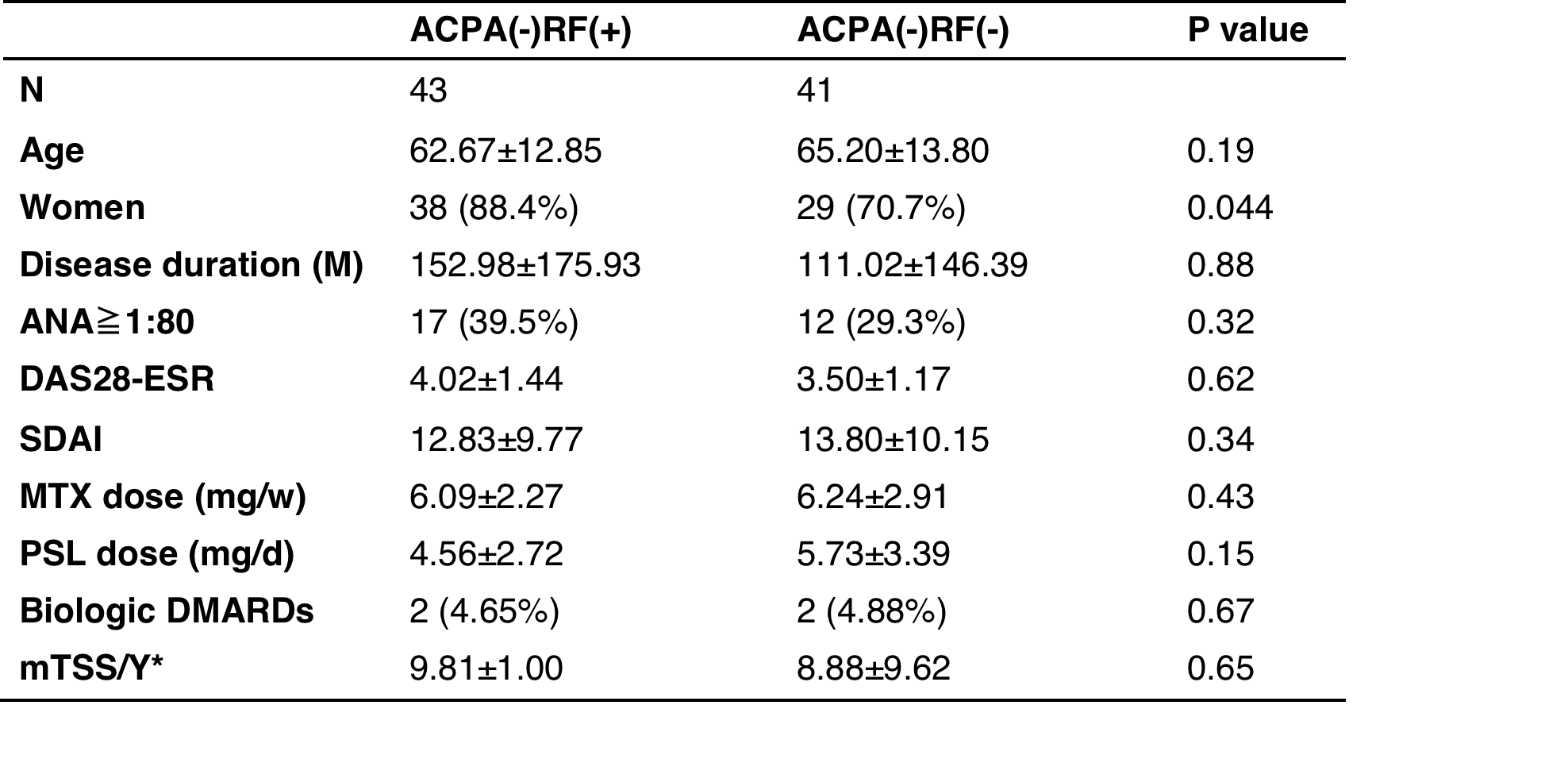Session Information
Session Type: Abstract Submissions (ACR)
Background/Purpose: Although anti-citrullinated peptide/protein antibody (ACPA) is a specific autoantibody for rheumatoid arthritis (RA), ~20% of RA are ACPA negative. It has been reported that ACPA(-) RA is a distinct subset clinically and genetically; radiographic progression is more severe in ACPA(+) RA and HLA-DR shared epitope is not associated with ACPA(-) RA. Recently we further subdivided ACPA(-) RA into rheumatoid factor (RF) positive and negative subsets and showed that HLA usage is different between ACPA(-)RF(+) RA and ACPA(-)RF(-) RA. Here we investigated the clinical characteristics of each subset.
Methods: RA patients were registered in the KURAMA cohort from May 2011 through May 2013 at Kyoto University Hospital and all the patients were Japanese. Titer of ACPA in sera or plasma was measured with the 2nd generation anti-CCP antibody ELISA kit. RF were measured with latex agglutination turbidimetric immunoassay. A patient was considered to be RF-negative when all the available tests were negative for RF. Age, sex, distribution of affected joints, positivity of anti-nuclear antibody (ANA), disease activity and treatment were assessed. Van der Heijde modified Sharp score (mTSS) of hands & feet X-ray films were scored by two evaluators.
Results: 84 out of 451 RA patients were negative for ACPA. In the ACPA negative group, 43 were positive for RF and 41 were RF-negative. There were significantly more women in RF-positive subset compared to RF-negative (88.4% and 70.7%, respectively). Distribution of affected joints and positivity of ANA, disease activity (DAS28-ESR, SDAI) were similar among the two subsets. Administration of methotrexate, oral glucocorticoid and biologic DMARDs were also similar. The mean of mTSS divided by the disease duration (mTSS/Y) of RF-positive subset were greater than RF-negative subset although there was no statistically significant difference (9.81±1.00 and 8.88±9.62, respectively). The other results were shown in table 1.
Table 1. Clinical characteristics of ACPA(-)RF(+) RA and ACPA(-)RF(-) RA
*mTSS were evaluated for 35 ACPA(-)RF(+) and 28 ACPA(-)RF(-) RA patients.
Conclusion:
Although ACPA(-)RF(+) RA and ACPA(-)RF(-) RA are genetically distinct, there seems to be no substantial clinical differences between those two subsets.
Disclosure:
R. Hiwa,
None;
K. Ohmura,
None;
N. Yamakawa,
None;
M. Furu,
None;
C. Terao,
None;
R. Nakashima,
None;
Y. Imura,
None;
N. Yukawa,
None;
H. Yoshifuji,
None;
M. Hashimoto,
None;
H. Ito,
None;
T. Fujii,
None;
T. Mimori,
None.
« Back to 2013 ACR/ARHP Annual Meeting
ACR Meeting Abstracts - https://acrabstracts.org/abstract/clinical-characteristics-of-rheumatoid-factor-positive-or-negative-subsets-of-anti-citrullinated-peptideprotein-antibody-negative-rheumatoid-arthritis/

